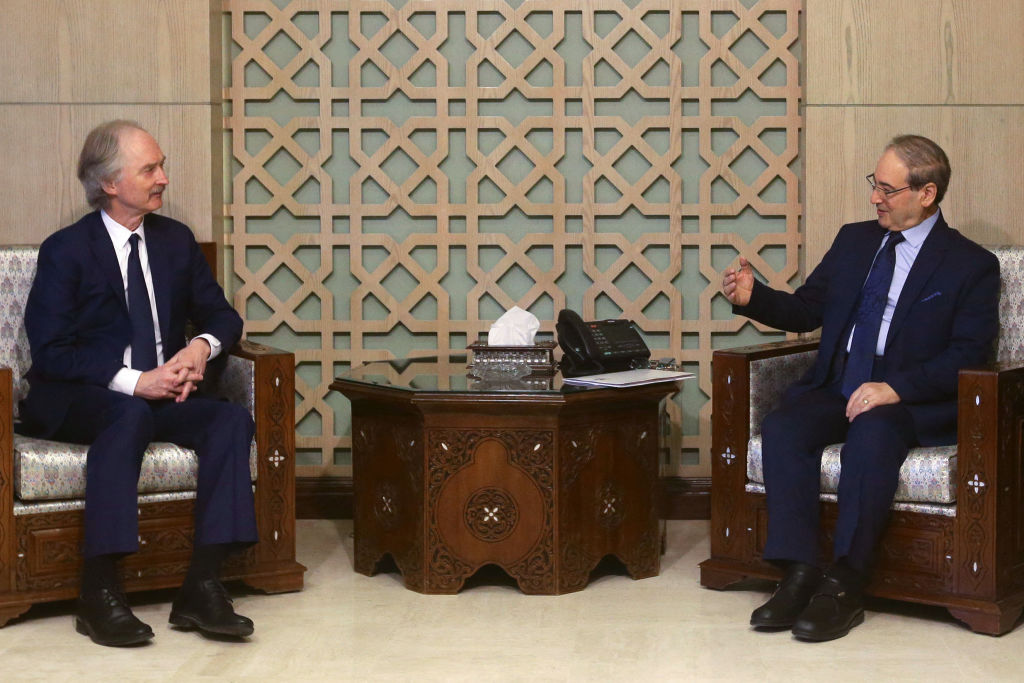
A UN envoy talks with Syria’s Sharaa and calls for an inclusive transition
In a meeting with Ahmed al-Sharaa, the commander of Syria’s new government, the U.N.’s envoy to Syria called for an inclusive Syrian transition based on a Security Council resolution that dates back nine years, the envoy’s office said Monday.
In a second statement, Syria’s ruling General Command claimed that they had discussed the need to review Security Council Resolution 2254 and adapt it to “suit the new reality” during their meeting with Geir Pedersen of the United Nations on Sunday.
For Sharaa, the head of the Islamist Hayat Tahrir al-Sham (HTS), which has taken control of Damascus since overthrowing Bashar al-Assad a little more than a week ago, the conference was one of the most important international meetings to yet.
In pictures from the meeting, Sharaa, whose group was affiliated with al-Qaeda until it broke with the terrorist network in 2016, was seen with Pedersen, the U.N. envoy for Syria since 2018. Sharaa was wearing an open shirt and blazer.
Western and regional nations, particularly Turkey, which has long been a major international supporter of the Syrian opposition, have declared HTS a terrorist organization.
After nearly 14 years of horrific civil war and more than 50 years of Assad family domination, the new government in Damascus has not provided many information about its plans for the future of Syria.
Mohammed al-Bashir, the recently appointed prime minister who previously oversaw an Idlib province government connected to the HTS, has stated that he will serve until March.
According to a statement from his office, Pedersen informed Sharaa of the results of an international meeting that was held in Jordan on Saturday.
“The Special Envoy briefed on the outcome of the Aqaba International Meeting … stressing the need for a credible and inclusive Syrian-owned and led political transition based on the principles of United Nations Security Council resolution 2254 (2015),” stated a statement issued by Pedersen’s office.
“The Special Envoy stressed the intention of the United Nations to render all assistance to the Syrian people.”
FOCUS ON THE UN RESOLUTION
Since Assad was overthrown and fled to Russia, U.N. Resolution 2254 has been a major diplomatic focus on Syria.
At the height of the conflict, which began with pro-democracy demonstrations against Assad’s authority in 2011, it was passed in 2015. Following Russia’s military intervention on Assad’s side to support his rule, the resolution was passed.
The resolution declares support for a UN-assisted Syrian-led political process that provides “credible, inclusive and non-sectarian governance and sets a schedule and process for drafting a new constitution” within a six-month timeframe.
Additionally, it declares support for free and fair elections that will take place within 18 months under the new constitution.
The speech “stressed the importance of rapid and effective cooperation to address the issues of the Syrians and the need to focus on the unity of Syria’s territories, reconstruction and achieving economic development” , according to the Syrian statement.
Sharaa highlighted the importance of “caution and precision in the stages of transition and rehabilitating institutions to build a strong and effective system” . The statement also underlined the significance of creating a safe environment for refugees to return and the need for political and financial support for this.
“Leader Sharaa pointed out the need to implement these steps with great care and high precision without haste and under the supervision of specialized teams, so that they are achieved in the best possible way,” stated the statement.
Kaja Kallas, the head of European Union foreign policy, announced Monday that she had directed the bloc’s senior diplomat in Syria to travel to Damascus and establish communication with the new government.
Russia’s military outposts in Syria are still up for debate, the Kremlin said Monday, adding that it was in communication with the country’s authorities.
Russia was withdrawing its troops from the front lines in northern Syria and from positions in the Alawite Mountains, but it was not abandoning its two main bases after Assad was overthrown, four Syrian officials told Reuters over the weekend.
All Categories
Recent Posts
Tags
+13162306000
zoneyetu@yahoo.com



